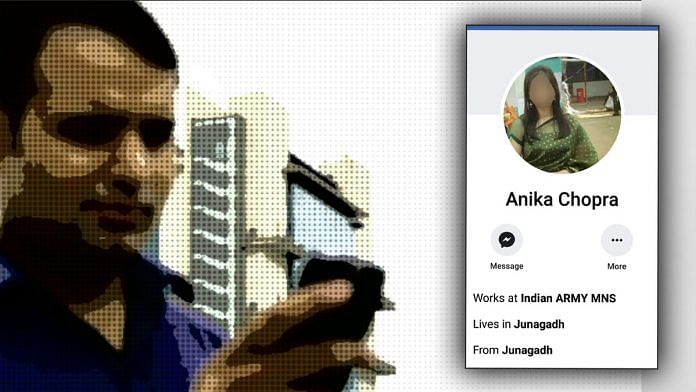An Indian Army jawan was detained last month for allegedly sharing sensitive information with a fake Facebook account that is part of a suspected honey-trap ploy.
New Delhi: Military Intelligence (MI) has discovered a Pakistan-based Facebook ID with an Indian name that is suspected to have been in touch with 50-60 Indian Army soldiers posted in sensitive areas, sources told ThePrint.
Sources said an Army jawan was detained earlier this month from Jaisalmer after MI discovered he was sharing confidential information with a Facebook account under the name ‘Anika Chopra’, which is suspected to be part of an ISI-led bid to honey-trap Indian soldiers.
They added that the ID had been active since 2016, and had coaxed the jawan, through sexual chat and photos, into sending pictures of his location, military exercises he took part in, as well as pictures of the “Arjun tank and its functioning”.
According to the sources, the woman had claimed to be a captain in the Medical Corps of the Indian Army.
Also read: Pakistan’s ISI is using pics of pretty women & social media to get India’s defence secrets
A potent threat
Though honey-trapping itself is an old concept, the use of social media to obtain sensitive information from soldiers of rival nations is a relatively new but potent phenomenon. It has led the Army, the Indian Air Force (IAF) and the Navy to issue clear directions and rules for officers and jawans on online interactions.
A high-profile case last year saw an IAF group captain get arrested for allegedly sharing sensitive information with two Pakistan-based Facebook accounts.
According to sources, the Pakistan intelligence agency, ISI, has “outsourced” the honey-trap work.
“They have outsourced this work to many groups who are paid a particular stipend,” said a source.
“It is their job to fish out details and the ISI comes directly into the picture when significant information starts flowing in from those honey-trapped,” the source added.
Sources said that since a quick response time was of the essence, humans, and not bots, monitored a slew of social media accounts of military personnel.
“A person will post a picture of let us say the desert and a tank,” said a source. “Immediately someone would like it and comment. Because the response time is fast, a conversation happens that leads to more and more in the coming days,” a source said.
The masterminds of these operations are believed to employ different strategies for officers and jawans: With jawans, it is more direct, sources said, and with officers the process is more refined and time-consuming.
“That (the operation targeting the IAF group captain) was an operation that took time and had a lot of sophistication,” a source said.
The IAF officer is accused of taking photographs of confidential defence documents and sending them via WhatsApp to ISI.
Most of the accounts used in such traps are believed to be operated by men back in Pakistan.
Sources said that an analysis of honey-trap cases reveals that many of them target men deployed in the western sector.
“In the northern sector, the internet is very bad and most work on a 24X7 basis, unlike the western sector, where the internet is available always and personnel have more time in their hands to be on social media,” a source said.
Also read: General Rawat says concern over internal security isn’t ‘politicisation’ of Indian Army
Social media rules
Social media rules for military personnel restrict them from watching porn on social networking sites, and posting photographs of themselves in uniform.
They are barred from clicking on advertisements promising alluring prizes/awards, and revealing their rank, unit name and location, or anything related to work.
“Do not accept friend request from unknowns; soldiers’ families should not post/mention their profession on sites; background of any picture should not contain anything related to military and do not store/save any information related to military in computer/laptops etc,” the social media directive for military personnel says.



